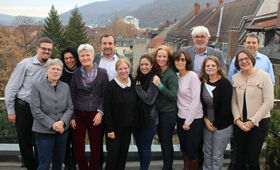Qualification in vocational education and training for persons with disability
Cooperation with Israeli vocational education and training experts
The German-Israeli programme, a project group comprising two national Teams, is addressing the issue of the training of personnel working in vocational education and training with persons with disability.
At the end of November, German and Israeli vocational education and training experts met in Heidelberg as part of a newly launched project team cooperation on the theme of “Training of vocational education and training staff for working with persons with disability”. “We are delighted about this close collaboration with the Israeli experts,” reports Kirsten Vollmer who is both head of the German project group and the research assistant responsible for the vocational education and training of persons with disability at the Federal Institute for Vocational Education and Training (BIBB). “Together we are examining how not only experts, but also training personnel in vocational education and training in Germany and Israel—whether they be, for example, trainers or vocational school teachers—might be better qualified for their work with disabled persons.”
Added value from German-Israeli cooperation
The cooperation started in summer 2018 and is based on a study tour—a period abroad for vocational education and training experts—in the German Israeli programme relating to the theme of “Vocational education and training for persons with disability”. “Together with the Israelis, we established during the study tour that, with regards to the training and professionalisation of various groups involved in the vocational education and training of persons with disability, we were still lacking an understanding regarding their practical knowledge and the particular challenges they face such as digitalisation and the increase in physical impairment,” explains Vollmer, who led the study tour in 2017. “The ongoing cooperation is particularly valuable to us because this theme of inclusion in Israel is also very important—and in this respect we are able to learn a great deal from one another.”
Initial findings in Heidelberg
The initial findings from both teams were compiled at the project meeting in Heidelberg. As part of this, the current situation in the countries was compared. Key questions included the following: Which staff are training persons with disability in their respective countries? What is the nature of the existing professions in each country? Who has which specialist additional qualifications? Are there transferable examples of success?
“In the second stage of the project, we now want to consider starting points identified in relation to the challenges presented given the significant changes in companies’ working and business processes on the one hand, and the particular concerns of persons with disability on the other,” explains Vollmer. “The insights and understanding gained, and discussions had, during the days spent together in Heidelberg and Mannheim at companies and businesses and in vocational schools and universities were very helpful in this respect. By fine tuning the training of vocational education and training personnel, we are seeking to make a contribution to getting even more persons with disability into vocational education and training and employment, and in this way facilitating their participation in both of these extremely relevant social sectors. At the same time we are seeking to support companies with well-qualified employees.”
Background to the Israel programme
The German-Israeli programme for collaboration in vocational education and training offers a range of different exchange formats between German and Israeli participants and institutions for the purpose of stimulating the continued development of vocational education and training systems in both countries and to promote cultural exchange. Target groups in this context are trainees, vocational education and training experts and academics. Within the scope of the activities, the programme provides participants with the opportunity to learn from and with one another.
German and Israeli experts meet as part of the project team cooperation to work together over the longer term on a theme which is relevant to both vocational education and training systems.
Further activities include the study tour—an exchange for vocational education and training experts—learning placements in another country for trainees, and seminars and conferences on current issues in vocational education and training.
The bilateral cooperation and support programme is funded by the Israeli Ministry of Labour and Social Welfare and by the German Federal Ministry of Education and Research (BMBF). The National Agency “Education for Europe” at the BIBB has been the implementing authority since 2013.
